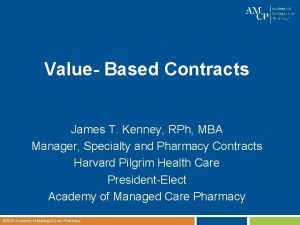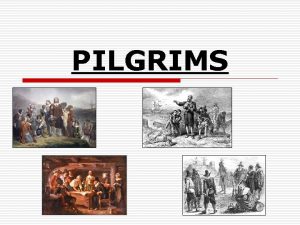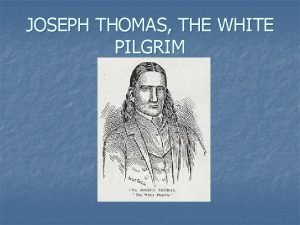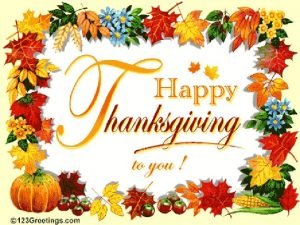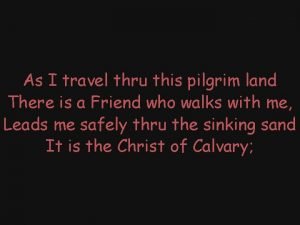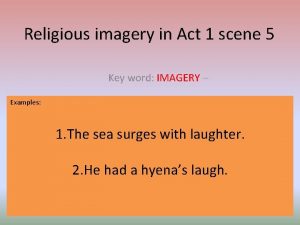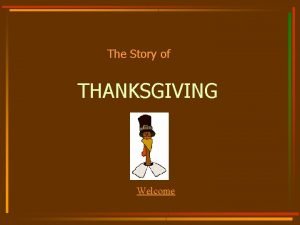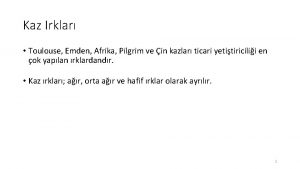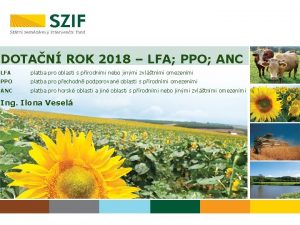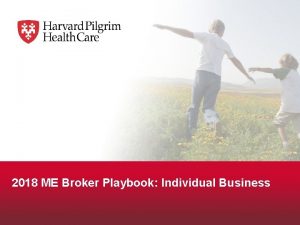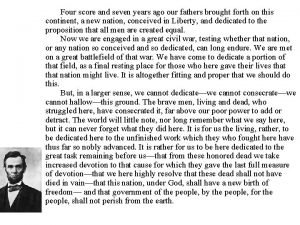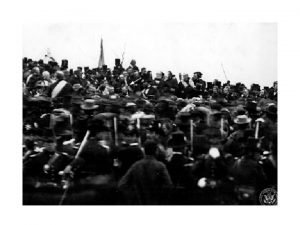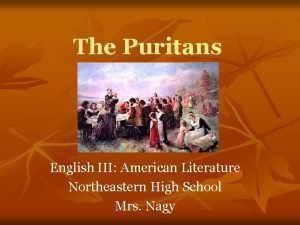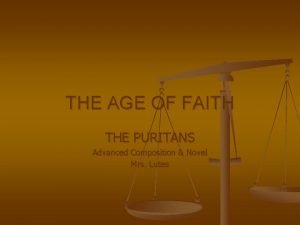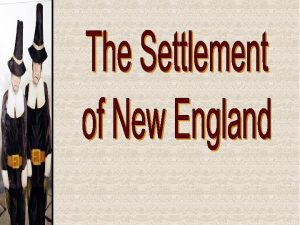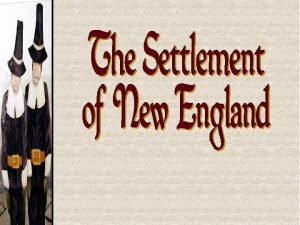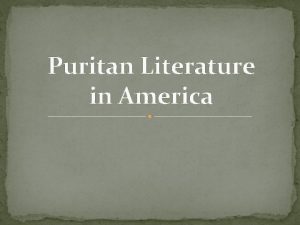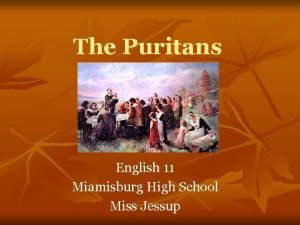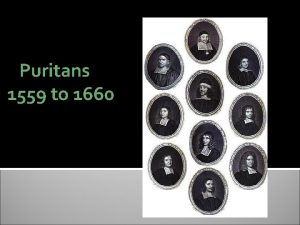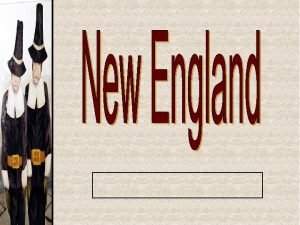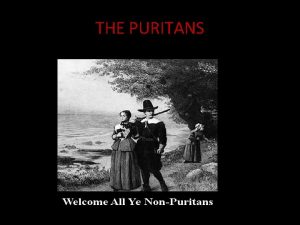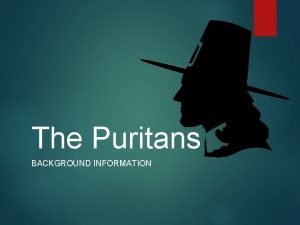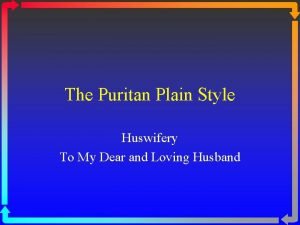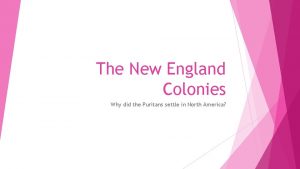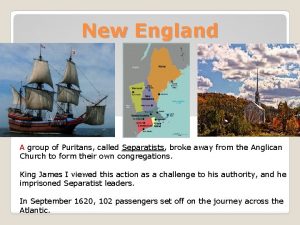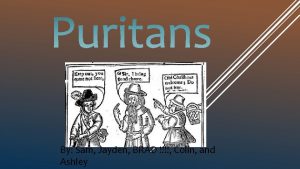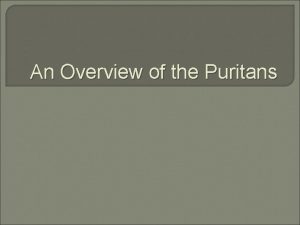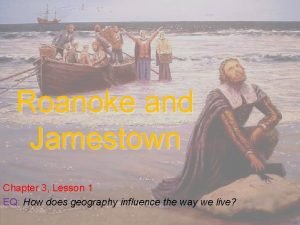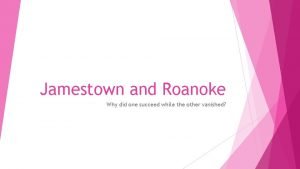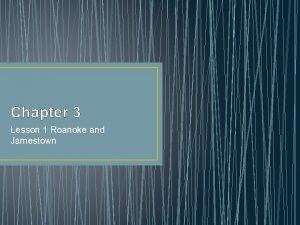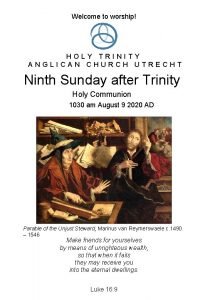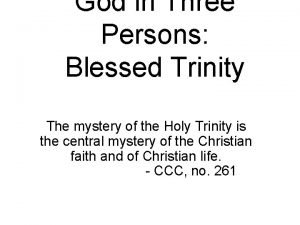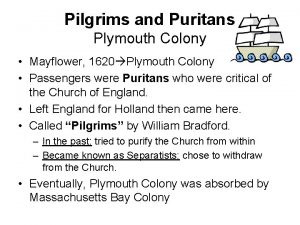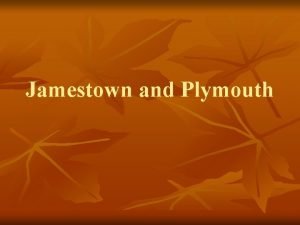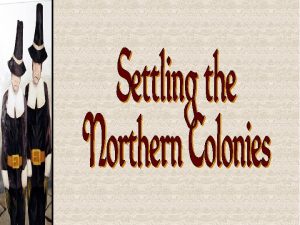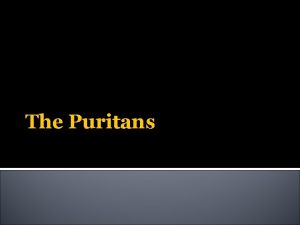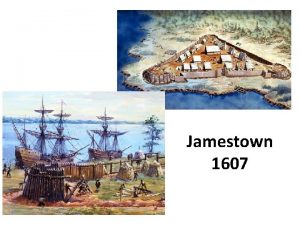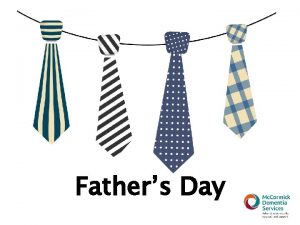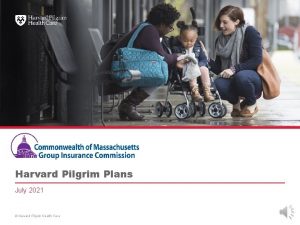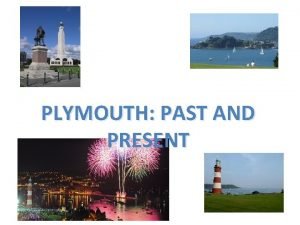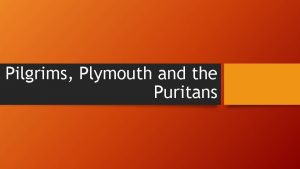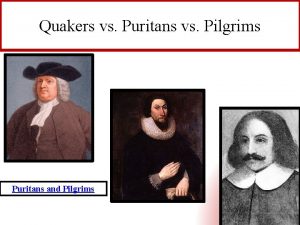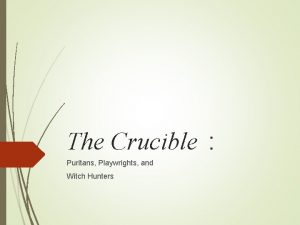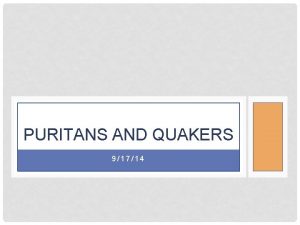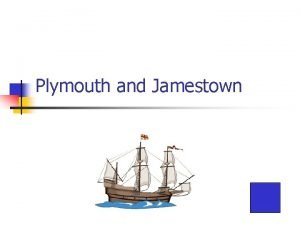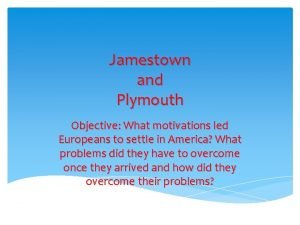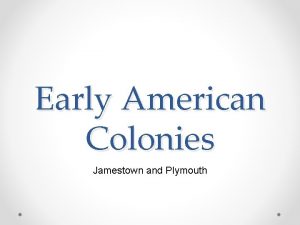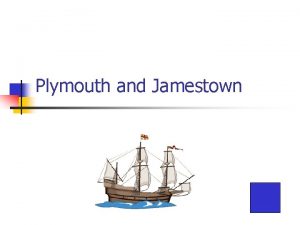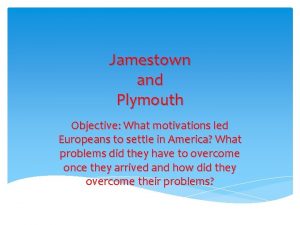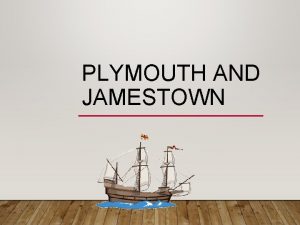JAMESTOWN PLYMOUTH THE PILGRIM FATHERS AND THE PURITANS







































- Slides: 39

JAMESTOWN, PLYMOUTH, THE PILGRIM FATHERS AND THE PURITANS AKE 117: American History Dr. Gamze Katı Gümüş

NATIVE PHILOSOPHY Landownership: Land was not owned, but it was inherited from the ancestors to be used collectively, and it needed to be protected for future generations. Warfare: War was not meant for the complete destruction of the enemy.

WHAT HAPPENE D? • Wars • Epidemics • Forcefully relocated o Some academics estimate that approximately 20 million people may have died in the years following the European invasion – up to 95% of the population of the Americas. *

JAMESTOWN & THE VIRGINIA COMPANY

JAMESTOWN (16061624) The Virginia Company sent three ships, which held 144 men: o the Susan Constant o the Godspeed o the Discovery In May 1607, 104 survivors disembarked on a spot close to swamps and dirty water. However, this spot was safe from attacks.


Swamps Typhoid SICKNESS STRIKES Dysentery Lack of basic hygiene Contaminated water supply Malnutrition

ECONOMICS In the beginning: Easily mined minerals A passage to the Pacific Native labor force Then: More settlers Production of grapes, sugar, tobacco, cotton and dye woods to be sold in England

1609 The company began selling public shares (previously it was financed by contributions of its contibutors and friends) People could buy shares, if they pledged personal service in the colony as a settler. How many shares the settler would receive depended on his social standing and skills.

JUNE 1609 • More settlers arrived—without leaders, for the vessel that carried the appointed officers was wrecked. • In May 1610, the officers arrived only to find 60 out of 400 settlers alive. • Jamestown was in ruins, there were neither agricultural goods nor domestic animals, and settlers had resorted to cannibalism during the starving times. • During the starving times they also ate various animals (dogs, horses, rats, snakes), and leather from their shoes and belts.

RELATIONS WITH THE NATIVES • In 1609, the Native chief Powhatan realized the aims of the English, and they attacked the settlers, killed their livestock and burned their crops. • Captain John Smith played an important role in the colony. He saved it from more drudgery, and yet he thought the Natives should be turned to slaves, and fought with them for food.

POCAHON TAS Colonists captured Powhatan’s favorite daughter Pocahontas in 1613, and she married John Rolfe. This marriage helped the relations between the Natives and the colonists. She was baptized as Rebecca, and upon her return from her voyage to England, she fell ill and died in 1617.

LORD DE LA WARR • The new governor restored discipline, created a sound agriculture, and established profitable relations with the Natives. • Lawes Divine, Morall and Martiall (1612): Settlers had to perform service, or otherwise they were subjected to severe penalties. • This harsh social discipline led to the shipment of goods—furs, timber, sassafras, iron, and tobacco—to England. • … and still this was not enough to flourish the colony and improve the financial situation of the company.

1618 SIR EDWIN SANDY S Sir Edwin Sandys became the new company treasurer of the colony. The Virginia Headright System granted sub-patents to land: 50 acres of land to each who paid for his/her own way 50 acres more for each additional person they brought along

• The Lawes of 1612 were replaced by a system of civil courts operating under English common law. • An assembly was convened in the colony, the representatives of which were elected by inhabitants. • It consisted of a governor, his council, and the representatives of four projected urban communities. GOVERNANCE

1619 A Dutch man-of-war brought first captive Africans to the colony as indentured servants, and African slave labor became the social and economic foundation of the colonies.

1622 • The Natives killed at least 347 settlers. • As the settlers sought revenge, they neglected to plant their crops, which resulted in a near famine and sickness in the winter of 1622 -23. • In 1624, only 1, 275 out of 8, 500 settlers were alive. • The company went bankrupt, and the Crown took over direct control of the colony.

THE COLON Y SUFFER ED FROM A CONST ANT LACK Food Laborers

The gentry was not eager to work as mere laborers, therefore the colony trusted on • African slavery • Native slavery • Involuntary servitude (4 years for adults, 5 -7 years for minors) …to do the hard work in colony-building.

WOMEN • Mail-order brides • Indentured servants-who endured physical labor in the fields and sexual abuse. • The presence of women was essential for the sustainment of the colonies. England thought women would prevent men from abandoning the colony. *

MAIL-ORDER BRIDES The Virginia Company offered attractive incentives for would-be wives: • free transportation • a plot of land • a dowry of clothing and furnishings • They also allowed the women to choose their husbands after entertaining the eager suitors*

In 1640, there were 150 black slaves. 1640 In 1704, theire numbers increased to 10, 000. 1704

CHATTEL SLAVERY • When white servitude became less profitable, laws specified that blacks would serve for life. But why? • Offspring automatically became slaves—maternal lineage • Conversion to Christianity did not mean freedom • The severity of punishment was up to the master • Racially mixed marriages were forbidden • Thus, African slaves became to be defined as property (chattel) rather than human beings.

PILGRIM FATHERS The Separatists, who considered the Church of England to be corrupted, left the country with hopes of building a church purified of rituals and corruptions. • First, they went to Netherlands in 1609. • Then, they immigrated to Virginia in 1620.

• They arrived at Provincetown in 1620, after a perilous voyage on Mayflower. • Of the 102 passengers on the Mayflower, there were 50 men, 19 women and 33 young adults and children. Just 41 were true Pilgrims, religious separatists. • The others were considered common folk and included merchants, craftsmen, indentured servants and orphaned children—the Pilgrims called them “strangers. ”*

When the Mayflower landed in Massachusetts instead of Virginia, discord began before the colonists even left the ship. The strangers argued the Virginia Company contract was void. They felt since the Mayflower had landed outside of Virginia Company territory, they were no longer bound to the company’s charter. The Mayflower Compact is important because it was the first social contract to establish self-government in the New World.

• William Bradford was elected governor for thirty times. He wrote Of Plymouth Plantation. • Though started out as a religious community, the colony was already showing signs of corruption when it was absorbed into the Puritan-dominated Massachusetts Bay Colony. • Pilgrims were known as forefathers or first-comers when they came to Virginia. The term “Pilgrim” did not appear until 1800 s.

THE ONLY WAY TO LIVE ACCORDING TO THE BIBLE IS PILGRIMS PURITANS To leave the Church of England To reform the Church of England

THE CHURCH OF ENGLAND • The British Monarch is the supreme governor of the Church. • The Church claims to be both Catholic and Reformed. • Since this Reformed Church retained many of the Catholic elements such as the Catholic order system (bishops, priests, deacons) and rituals, some people believed it was not reformed enough.

PURITANS Within weeks, more than 200 Puritan settlers sailed to the New World. 1628 In 1628, a group of religious dissenters formed the New England Company. In 1629, they obtained a Crown charter that created the Massachusetts Bay Company.

ACCORDING TO THE CHARTER • The colonists could trade and settle within the lands already given to the New England Company. • But most importantly, the company could “govern and rule all of His Majesty’s subjects that reside within the limis of the plantation. ”

• John Winthrop was elected governor in 1629. • The Puritan leaders were self-confident, determined and authoritative. • They had a strict religious commitment. • They desired to transfrom the Church of England as well as the society. • ”By persuasion if possible but by force if necessary”*

• The Puritan belief focused on the family. Unlike other European migrations, which were mainly composed of young unattached men, Puritan immigration was a migration of families.

THE GREAT MIGRATION In 1630, the Puritan migration began with more than 1, 000 settlers within the year. 1630 During the Puritan Exodus (1630 -43) more than 20, 000 settlers migrated to the New England. 1630– 1643

• After the colonists got the approval of the General Assembly to establish towns, they received the legal right to create a limited jurisdiction, and to send representatives to the General Court. • The land of a town was divided among the heads of the households in proportion to their wealth and status. • As founding members of their local church, they dominated the religious realm. • These men also had a voting membership in the town’s political assembly, which led them to regulate the everyday affairs of the community. ECONOMICS, RELIGION, AND POWER

THE INITIAL GENERAL COURT The governor The Council of Magistrates Freemen (voters)

• In 1631, a new rule was introduced which said that only church members could vote. Therefore, the colonial government could continue to represent primarily those loyal to the Puritan ideas. • The founders’ rights were not automatically granted to the newcomers, but only to their direct heirs.

ACHIEVEMENTS • Cleared wilderness • Organized towns • Organized courts • Created a general government • Expanded the coastal and transatlantic commerce

CHRONOLOGY Jamestown is established Mayflower Compact is signed 1619 1607 Reign of Charles I 1620 First Africans arrive in Virginia Puritan emigration 1626 1625– 1649 Plymouth Colony is established Dutch settle Manhattan 1630– 1643
 Jamestown and plymouth venn diagram
Jamestown and plymouth venn diagram Romeo and juliet act 1 scene 5 summary
Romeo and juliet act 1 scene 5 summary Jim kenney harvard pilgrim
Jim kenney harvard pilgrim Pilgrim vs puritan
Pilgrim vs puritan The white pilgrim
The white pilgrim Pilgrims
Pilgrims Vlisen
Vlisen As i travel through this pilgrim land
As i travel through this pilgrim land Imagery in romeo and juliet act 1 scene 5
Imagery in romeo and juliet act 1 scene 5 Translater
Translater Pilgrim kazı
Pilgrim kazı Anc 2018
Anc 2018 Pcp id number lookup harvard pilgrim
Pcp id number lookup harvard pilgrim Four scores and seven years ago
Four scores and seven years ago How much is four score and seven years
How much is four score and seven years Puritans beliefs
Puritans beliefs Puritan beliefs
Puritan beliefs Puritan vs separatist
Puritan vs separatist Separatists vs puritans
Separatists vs puritans Puritanism vs calvinism
Puritanism vs calvinism Puritan literature
Puritan literature Puritan garb
Puritan garb Puritans beliefs
Puritans beliefs Puritans quotes
Puritans quotes Puritans vs separatists
Puritans vs separatists Total depravity puritans
Total depravity puritans Puritans tulip
Puritans tulip Puritans vs protestants
Puritans vs protestants Puritans background
Puritans background Examples of puritan plain style
Examples of puritan plain style Why did the puritans settle in new england
Why did the puritans settle in new england Which political cultural and economic characteristics
Which political cultural and economic characteristics Puritans who broke away from the anglican church
Puritans who broke away from the anglican church Why did the puritans cross the atlantic ocean
Why did the puritans cross the atlantic ocean Puritans vs. pilgrims
Puritans vs. pilgrims Lesson 1 summary roanoke and jamestown answer key
Lesson 1 summary roanoke and jamestown answer key Why did roanoke fail and jamestown succeed
Why did roanoke fail and jamestown succeed Colonial america lesson 1 roanoke and jamestown
Colonial america lesson 1 roanoke and jamestown Holy trinity utrecht
Holy trinity utrecht Trinity
Trinity


